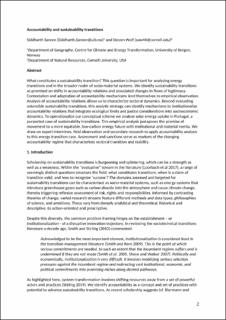| dc.contributor.author | Sareen, Siddharth | |
| dc.contributor.author | Wolf, Steven A. | |
| dc.date.accessioned | 2022-02-21T09:01:45Z | |
| dc.date.available | 2022-02-21T09:01:45Z | |
| dc.date.created | 2021-08-18T18:44:49Z | |
| dc.date.issued | 2021 | |
| dc.identifier.citation | Sareen, S., Wolf, S.A. (2021) Accountability and sustainability transitions. Ecological Economics, 185, 107056. | en_US |
| dc.identifier.issn | 0921-8009 | |
| dc.identifier.uri | https://hdl.handle.net/11250/2980392 | |
| dc.description.abstract | What constitutes a sustainability transition? We identify sustainability transitions as premised on shifts in accountability relations – assessments of conformance with institutional controls coupled with application of sanctions, incentives, and subsidies – which structure the selection pressures that shape future demographics, technical practices, and social and material trajectories of an economic sector or domain. Contestation and adaptation of accountability mechanisms lend themselves to empirical observation. Beyond evaluating institutional changes that might support a sustainability transition, our analytic framework positions us to identify incoherent, hollow and regressive modes of accountability that constrain sustainability transitions. To operationalize our conceptual scheme, we analyze a purported case of sustainability transitions, solar energy in Portugal during the period 2017–2020. This empirical analysis juxtaposes the promise of movement to a more equitable, low-carbon energy future with institutional and material inertia. We draw on expert interviews, field observation and secondary research to apply accountability analysis to this energy transition case. We find evidence of shifts in relations of accountability that bode well for accelerated growth of solar uptake in Portugal. More broadly, this pilot application of an analytic framework for studying relations of accountability shows significant promise for advancing environmental governance research. | en_US |
| dc.language.iso | eng | en_US |
| dc.publisher | Elsevier Ltd. | en_US |
| dc.rights | Attribution-NonCommercial-NoDerivatives 4.0 Internasjonal | * |
| dc.rights.uri | http://creativecommons.org/licenses/by-nc-nd/4.0/deed.no | * |
| dc.subject | økonomi | en_US |
| dc.subject | solkraft | en_US |
| dc.subject | bærekraft | en_US |
| dc.title | Accountability and sustainability transitions | en_US |
| dc.type | Peer reviewed | en_US |
| dc.type | Journal article | en_US |
| dc.description.version | acceptedVersion | en_US |
| dc.rights.holder | © 2021 Elsevier B.V. All rights reserved. | en_US |
| dc.subject.nsi | VDP::Samfunnsvitenskap: 200::Økonomi: 210::Bedriftsøkonomi: 213 | en_US |
| dc.subject.nsi | VDP::Teknologi: 500 | en_US |
| dc.source.pagenumber | 11 | en_US |
| dc.source.volume | 185 | en_US |
| dc.source.journal | Ecological Economics | en_US |
| dc.identifier.doi | 10.1016/j.ecolecon.2021.107056 | |
| dc.identifier.cristin | 1927076 | |
| dc.relation.project | Norges forskningsråd: 314022 | en_US |
| dc.source.articlenumber | 107056 | en_US |
| cristin.ispublished | true | |
| cristin.fulltext | postprint | |
| cristin.qualitycode | 1 | |

